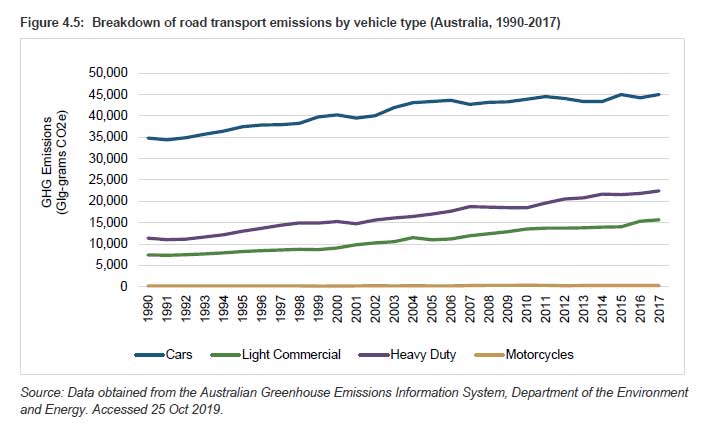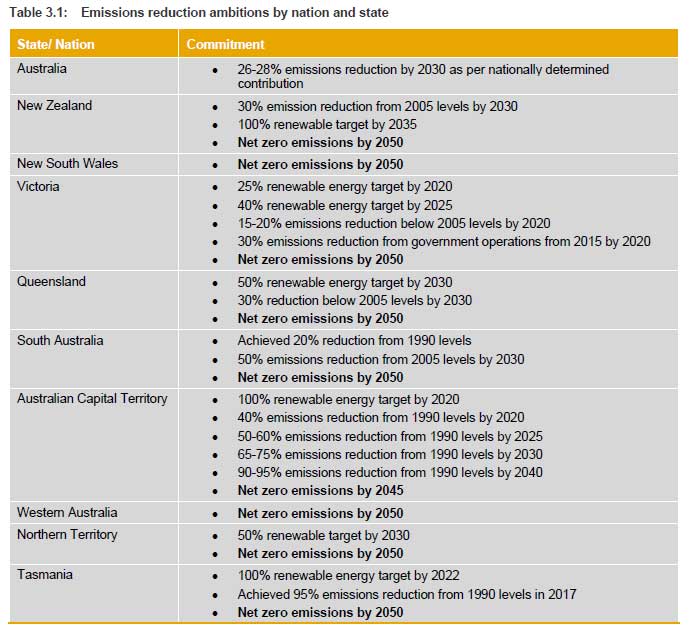One of Australia’s leading transport lobby groups has called for an accelerated uptake of electric vehicles, and declared that old “gas guzzlers” should be retired from the passenger fleet before it is too late to reach ambitious climate goals.
A new report – “Decarbonisation of Road Transport Network Operations in Australia and New Zealand” – from the Australasian road and traffic agency body Austroads, says the transport sector offers huge potential to cut greenhouse gas emissions in Australia and New Zealand.
But it notes that current policies are not consistent with the assumed long term goal of reaching zero emissions and will lead only to an increase in the short to medium term.
It says policy intervention is needed to accelerate the adoption of electric vehicles in both the passenger and freight sectors, but older vehicles should be retired rather than sold to other users on the second hand market if the 1.5°C Paris targets are to be reached.
Moves to encourage the retirement of older vehicles – including the so-called “cash for clunker” incentives – have been adopted in France and recently proposed in the UK. French president Emmanuel Macron has recently sought to reintroduce incentives for EVs as part of the country’s mission to kickstart the economy post-Covid.
New Zealand has also taken a lead on the road to electrification of transport in the Pacific region – in July 2019 it proposed a Clean Car Discount for drivers buying low and zero emissions vehicles and a fee for those buying heavy polluters, as well as fuel emissions policy that would encourage car dealers to favour cleaner car imports after 2021.
In Australia, the federal Coalition government has promised an electric vehicle strategy by mid-2020, but it is yet to deliver – even though its own data shows that private cars are the biggest driver of transport emissions in Australia. (See table below).

“The electrification of the vehicle fleet in concert with the transition of the stationary energy sector towards renewable energy is a critical component in the long-term decarbonisation of the roads sector,” the Austroads report says..
“Moderate or accelerated policy interventions in support of EV sales in both passenger and freight sectors are required to address medium- and long-term road transport emissions,” it says, adding “the retirement of older vehicles from the fleet is a strong driver of emissions reduction in partnership with the support for new EV sales.”
The importance of a retirement plan is underscored by modelling that shows, in order to reach a 90% replacement of the current internal combustion engine (ICE) fleet, the last such passenger vehicles must all be sold by 2024.
For other vehicle types it is already too late, says the report. All heavy rigid trucks should have been retired in 2000, all light rigid and prime mover vehicles by 2011 and all buses by 2017.
“Most of these threshold dates are in the past, suggesting that 90% retirement of these vehicles by 2050 is unlikely,” says the report.
“This further suggests that the pattern of existing vehicle retirement from the fleet will need to change for a fleet transition more in line with deeper penetration of electric vehicles in the fleet and corresponding higher ambitions for emissions reduction by 2050.”
Of course, the loss in value of vehicles such as these, should they be retired before their useful lives are up, would be likely to cause financial suffering for businesses in particular. Hence the need for incentives to do so.
“Social equity is one of the important considerations in accelerating early retirement of vehicles with internal combustion engines from the fleet. There is a risk that a loss of residual value in vehicles with an internal combustion engine due to policy changes could negatively impact vulnerable communities or demographics,” says the report.
“The social and economic impacts of policy toward this end should be carefully considered to moderate impacts by more targeted support to low/socio economic demographics.”
Switching modes
While it acknowledges that there are difficulties with linking sector-specific policy with trajectories aimed at reaching the 1.5°C emission reduction goal set out in the Paris agreement, it notes that national level policies have an important role to play.
“The transportation sector needs to position itself to transition away from liquid fossil fuels and take advantage of the transition of the electricity grid to renewable energy,” reads the report.
“Furthermore, the roads sector needs to drive behaviour change in reducing the reliance of passengers and freight on the road network as well as encouraging other modal alternatives.”
These are discussions that are being had at several government levels as Australia moves out of the stay-at-home period necessary to contain the Covid-19 pandemic.
One such discussion was chaired on Thursday by Victorian councillor Fiona Patten in a Committee for Melbourne Transport Taskforce webinar that included e-scooter startup Lime’s director of government relations Mitchell Price and e-scooter company Raine co-founder Michelle Mannering.
It sought to open discussion on ways to encourage people starting to go back to work to embrace other modes of transport.
Switching transport modes away from private vehicles is important for short trips within cities, but central to the report’s findings are that electric vehicle sales require policy intervention to meet national and state zero emissions targets.

As New Zealand proposes to, there are numerous countries that already offer generous EV purchasing incentives, a fact that has been outlined by Electric Vehicle Council CEO Behyad Jafari on Twitter, where he invited prime minister Scott Morrison to consider doing the same if he is to attend the upcoming G7 summit.
Scott Morrison upon invitation to the G7 Summit may want to look at what other advanced economies are doing. pic.twitter.com/JlDMZUjVEx
— Behyad Jafari ⚡???? (@BJafari) June 10, 2020
To date, current state EV incentives include government fleet incentives and targets (including a 100% bus target) and stamp duty discount in NSW, luxury car tax exemption and stamp duty discount in Victoria, stamp duty exemption and and 100% government fleet target in the ACT, and a stamp duty discount in Queensland.

Bridie Schmidt is associate editor for The Driven, sister site of Renew Economy. She has been writing about electric vehicles since 2018, and has a keen interest in the role that zero-emissions transport has to play in sustainability. She has participated in podcasts such as Download This Show with Marc Fennell and Shirtloads of Science with Karl Kruszelnicki and is co-organiser of the Northern Rivers Electric Vehicle Forum. Bridie also owns a Tesla Model Y and has it available for hire on evee.com.au.

